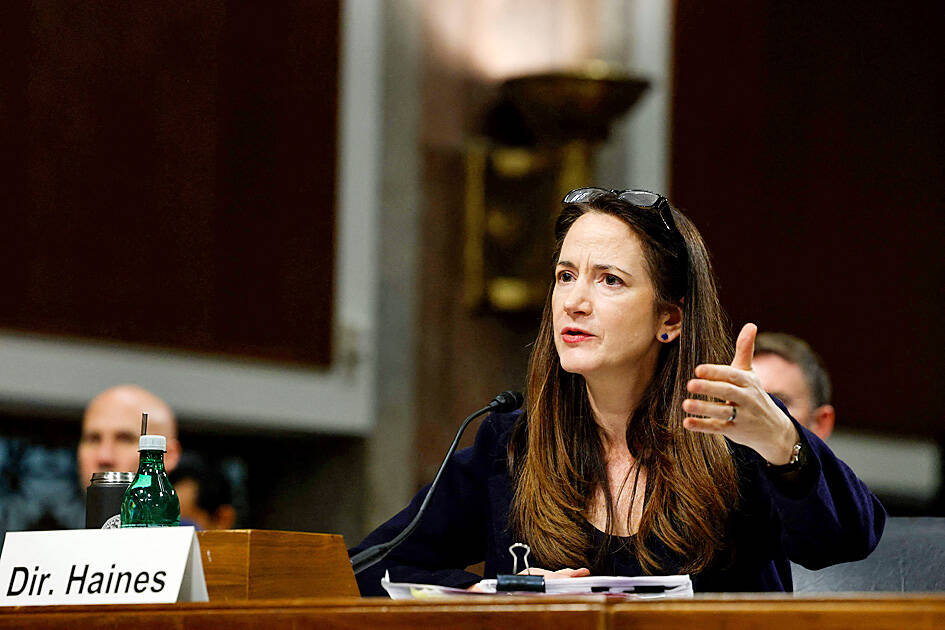A Chinese invasion of Taiwan could halt production by the world’s largest advanced chipmaker, wiping out up to US$1 trillion per year from the global economy in the first few years, the top US intelligence official told a hearing on Capitol Hill on Thursday.
US Director of National Intelligence Avril Haines presented what she called a “general estimate” during testimony before the US Senate Armed Services Committee.
The advanced semiconductors produced by Taiwan Semiconductor Manufacturing Co (TSMC, 台積電) are used in 90 percent of “almost every category of electronic device around the world,” she said.

Photo: AFP
If a Chinese invasion stopped TSMC from producing those chips, “it will have an enormous global financial impact that I think runs somewhere between US$600 billion to US$1 trillion on an annual basis for the first few years,” she said.
“It will also have an impact on [US] GDP if there was such an invasion of Taiwan and that [TSMC’s production] was blocked,” Haines said.
It would also have a large impact on China’s economy, she added.
To deal with that risk, TSMC is investing US$40 million to build two sophisticated wafer fabs in Arizona at Washington’s urging.
A fab using the 4-nanometer process is scheduled to begin mass production next year, and the other, using the more advanced 3-nanometer process, is slated to mass-produce chips starting in 2026.
Also at the hearing, Haines said that Chinese President Xi Jinping (習近平) is leaning toward unifying with Taiwan in a “peaceful” manner, but is also preparing possible military action to achieve that goal.
“I think we continue to assess that he [Xi] would prefer to achieve unification of Taiwan through peaceful means,” she said, citing US intelligence.
Regardless, Xi has directed the Chinese military to “provide him with a military option, essentially, to be able to take it without concern of [US] intervention,” which is expected to “have a meaningful impact on his capacity to do so,” Haines said.
Haines’ comments came after US Senator Rick Scott raised concerns about the possibility of China invading Taiwan, citing Xi’s remarks in the past year suggesting that he was preparing the Chinese population for a war against Taiwan.
Also at the hearing, US Defense Intelligence Agency Director Scott Berrier appeared to have greater concern than Haines about a possible invasion of Taiwan, saying that Xi’s rhetoric has been “picking up” after he assumed his third term as president.
Berrier provided a list of possible invasion dates ranging from 2025 to 2049.
“I think the bottom line is he’s told his military to be ready,” Berrier said.
Meanwhile, Haines said the relationship between the US and China has become “more challenging,” citing a speech made by Xi in March in which he blamed Washington for suppressing Beijing, reflecting his distrust of the US and his belief that Washington is seeking to contain his country.
In his March 6 speech, Xi accused the US of trying to isolate his country and hold back its development, and a US-led campaign of “containment and suppression” of China has “brought unprecedented, severe challenges.”
Despite Xi’s strong rhetoric, Haines said her agency’s intelligence suggests that China wants to preserve stability in a bid to avoid triggering additional technology restrictions or sanctions from the US.

The CIA has a message for Chinese government officials worried about their place in Chinese President Xi Jinping’s (習近平) government: Come work with us. The agency released two Mandarin-language videos on social media on Thursday inviting disgruntled officials to contact the CIA. The recruitment videos posted on YouTube and X racked up more than 5 million views combined in their first day. The outreach comes as CIA Director John Ratcliffe has vowed to boost the agency’s use of intelligence from human sources and its focus on China, which has recently targeted US officials with its own espionage operations. The videos are “aimed at

STEADFAST FRIEND: The bills encourage increased Taiwan-US engagement and address China’s distortion of UN Resolution 2758 to isolate Taiwan internationally The Presidential Office yesterday thanked the US House of Representatives for unanimously passing two Taiwan-related bills highlighting its solid support for Taiwan’s democracy and global participation, and for deepening bilateral relations. One of the bills, the Taiwan Assurance Implementation Act, requires the US Department of State to periodically review its guidelines for engagement with Taiwan, and report to the US Congress on the guidelines and plans to lift self-imposed limitations on US-Taiwan engagement. The other bill is the Taiwan International Solidarity Act, which clarifies that UN Resolution 2758 does not address the issue of the representation of Taiwan or its people in

US Indo-Pacific Commander Admiral Samuel Paparo on Friday expressed concern over the rate at which China is diversifying its military exercises, the Financial Times (FT) reported on Saturday. “The rates of change on the depth and breadth of their exercises is the one non-linear effect that I’ve seen in the last year that wakes me up at night or keeps me up at night,” Paparo was quoted by FT as saying while attending the annual Sedona Forum at the McCain Institute in Arizona. Paparo also expressed concern over the speed with which China was expanding its military. While the US

SHIFT: Taiwan’s better-than-expected first-quarter GDP and signs of weakness in the US have driven global capital back to emerging markets, the central bank head said The central bank yesterday blamed market speculation for the steep rise in the local currency, and urged exporters and financial institutions to stay calm and stop panic sell-offs to avoid hurting their own profitability. The nation’s top monetary policymaker said that it would step in, if necessary, to maintain order and stability in the foreign exchange market. The remarks came as the NT dollar yesterday closed up NT$0.919 to NT$30.145 against the US dollar in Taipei trading, after rising as high as NT$29.59 in intraday trading. The local currency has surged 5.85 percent against the greenback over the past two sessions, central